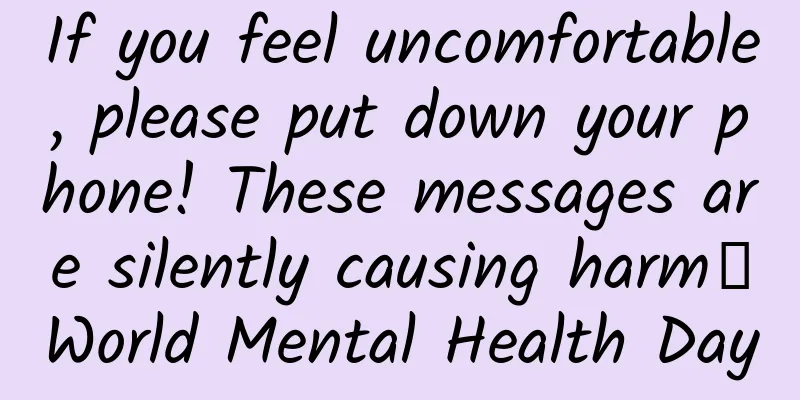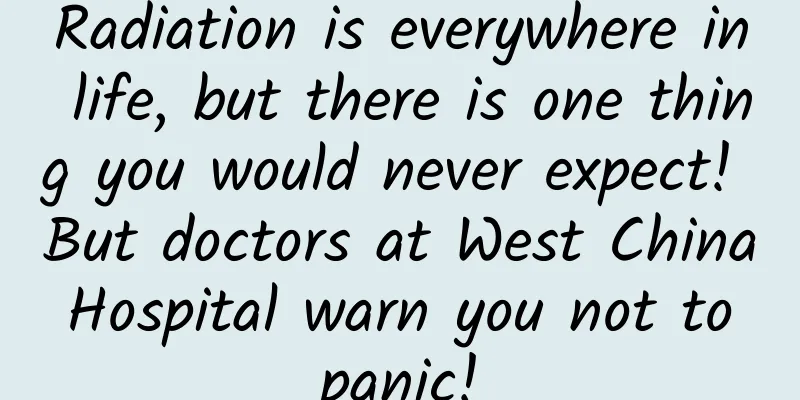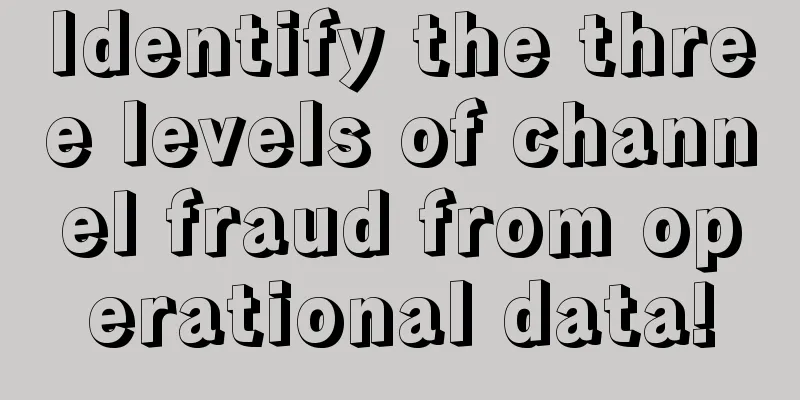If you feel uncomfortable, please put down your phone! These messages are silently causing harm丨World Mental Health Day

|
Content planning and review: Li Bin Beijing Union University Reviewer: Li Xianhong National Level 2 Psychological Counselor Since the outbreak, social networks have been flooded with news about the epidemic. Faced with the rising number of confirmed cases in epidemic areas, closed urban communities, suspended public transportation, and restricted group activities... people can't help but worry about their health codes changing color, pop-up windows appearing, or worrying about insufficient food and epidemic prevention supplies at home and continuing to stock up, and even panic, anxiety, and insomnia. What's going on? Why are there such strong emotions? October 10th of every year is World Mental Health Day, and this year's theme is "Creating a good environment to help mental health". Taking advantage of this time point today, let's talk about the emotional loss and other problems that people have experienced under the continuous influence of negative information. Source: National Health Commission In fact, falling into emotional distress after seeing negative events is a kind of "vicarious trauma", and such emotions are very common in daily life. When a major catastrophic event occurs, the atmosphere on the Internet becomes particularly sad. Behind each regrettable news, vicarious trauma must be prevented. The concept of vicarious trauma As a psychological term, the earliest research data on vicarious trauma comes from the psychological treatment of war veterans . The data show that some families of war veterans will have reactions similar to the symptoms of post-traumatic stress disorder. As psychologists continue to deepen their research, our current definition of vicarious trauma is: individuals who have not personally experienced traumatic events, learn relevant information through various channels such as reports, broadcasts, and interpersonal communication, and experience traumatic reactions such as physical and mental distress due to sympathy and empathy for the trauma suffered by others. Source: Global Science When people face sudden negative events, it is normal for them to have sympathy, anxiety, guilt, etc. However, the duration of such emotional reactions varies from person to person. Some people will gradually recover over time, but others will prolong the negative emotional cycle due to vicarious trauma, become overly depressed or excited, and even affect their normal life. Common vicarious trauma populations In terms of psychological treatment, rescue workers, medical workers, and media workers are the vicarious trauma groups that need the most attention. People involved in rescue activities, whether they are professionals with rescue experience or those who "see injustice on the road", are all high-risk groups for psychological problems. Generally speaking, the rescue work is arduous, the rescue conditions are poor, the rescue pressure is high...all these reasons will bring challenges to the rescuers' physiology and psychology. Emotionally, they will inevitably have emotions such as tension, fear, and grief; physically, high-intensity work will induce somatic symptoms such as insomnia, stomach pain, loss of appetite, and dizziness. Under constant stress, they will also have negative emotions such as guilt and self-blame. Therefore, it is very necessary to provide psychological assistance to rescuers in a timely manner and reduce their psychological pressure. Source: Xinhuanet The same is true for medical workers who often appear at accident scenes. They use their professional knowledge to participate in on-site rescue, treat the injured, and even deal with the aftermath of the dead. Faced with complex medical conditions and the regret of being unable to save the patient, they have also become the main group of people who suffer from vicarious trauma. Some medical staff will feel sad and anxious because they have not effectively treated the injured. In the case of extreme fatigue, they also suffer from stress reactions such as insomnia, loss of appetite, and physical discomfort. Source: Xinhuanet As communicators of the accident scene, many media workers who come to the scene to interview are also prone to vicarious trauma. The anxiety and stimulation when facing the scene and the secondary impact when writing the news cause them to have traumatic psychological reactions such as flashbacks, anxiety, depression, and eating and sleeping disorders. Manifestations of vicarious trauma Vicarious trauma affects life in many ways. Physiologically, the body will experience a series of discomfort symptoms, such as dizziness, difficulty breathing, tension, stomach pain, muscle tension, etc. Psychologically, people will be exhausted, have difficulty concentrating, lose their sense of security and their belief in fairness, good and evil, and even have poor communication and irritability in interpersonal relationships. Some people may even have a negative outlook on life , feel weak, guilty and ashamed. Source: pixabay How to deal with vicarious trauma How should we respond to vicarious trauma? Experts offer the basic principles of “awareness, balance, and connection.” Awareness requires individuals to accept and focus on their own inner experiences. When an unbalanced mental state occurs, discover and acknowledge it early, do not deliberately avoid it, and face the emotional problem directly. Source: Internet Balance means maintaining an individual's basic pace of life. For example, when you are anxious, you can try more relaxing activities. Bathing, listening to music, walking, running, swimming, and playing ball are all good choices. Contact means maintaining communication with the outside world. When psychological problems arise, we should not complain about ourselves. We should learn to express ourselves, communicate with others, and seek help from relatives and friends to adjust our psychological discomfort. In modern society, whenever negative events occur, the ubiquitous mass media will deliver pictures, voices, videos, etc. to us. Faced with this information, even ordinary people are prone to vicarious trauma after falling into a low mood. Source: pixabay Therefore, when we are immersed in negative emotions, please cut off contact with these events as soon as possible ; in the subsequent attention, learn more reliable information trends, and at the same time abandon shame and do more things that can divert your attention ; if you still cannot face it, you must seek help from a professional psychologist . Unexpected events happen all the time, and people are subject to misfortunes and blessings at any time. Whether it is a post about a person who has no one to turn to for help and has lost a loved one, or an accident scene where life disappears in an instant and the whole place is scorched earth, the loss of life is truly sad and regrettable, so we should realize how precious life is. When negative emotions come, we can adjust our mentality. If we feel that we have been affected by negative emotions, we should cut off the source of information in time. At the same time, if we have the energy, we should also release a positive emotional atmosphere around us. Create a good environment, help mental health , and face life with a more positive and optimistic mood. |
<<: World Mental Health Day丨Ding Dong! Please keep this guide to mental health care!
Recommend
The stomach is most afraid of these "several things". One more thing will bring you closer to gastric cancer! Doctors: Many people are diagnosed at the late stage
Expert of this article: Hu Zhongdong, chief physi...
The big guy wants to "lose weight" Lincoln's new Navigator latest news
Recently, overseas media reported more news about ...
Go to Jiangxi and see Poyang Lake!
China Thousands of lakes But there is a big lake ...
Dingxiang Mama_Medical Cosmetic Surgery Guide 2021 Edition
Dingxiang Mama·Medical Cosmetic Surgery Guide 202...
How much does it cost to attract investment for the Nanchong Rubber and Plastic Mini Program? What is the investment quotation of Nanchong Rubber and Plastic Mini Program?
Starting a business requires costs, and mini prog...
Good immunity means no illness! Do more "10 ones" to improve immunity
Good immunity means no illness! A good way to imp...
What do backlinks mean in SEO?
As the core of search engine algorithms such as B...
108 Internet Marketing Tools/Websites
Ever since the Wei Zexi incident broke out last y...
3 questions you must know about APP promotion and operation
3 questions you must know about APP promotion and...
Extinct duck species
Geese and ducks are almost one of the most famili...
There are no elephants who died of old age. The natural causes of death of elephants are surprising.
Birth, aging, illness and death are the natural l...
Drinks are also divided into different grades?! As expected, the ones I like to drink are C and D...
Shanghai recently piloted a "Nutritional Cho...
Bringing old speakers to life: Chromecast Audio hands-on experience
Along with the release of the upgraded Chromecast...
[Popular Science of Chinese Military Technology] How does armor perspective technology allow tank soldiers to use "hacks"?
With the progress of the times, the wide area and...









